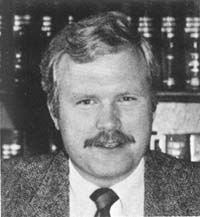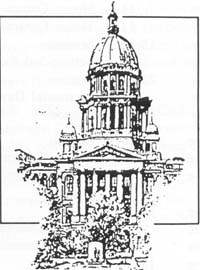 |
Home | Search | Browse | About IPO | Staff | Links |
 |
Home | Search | Browse | About IPO | Staff | Links |
|
Legal/Legislative Scene
GOVERNOR THOMPSON
PROPOSES $26 BILLION STATE BUDGET
|

|
Governor James R. Thompson, in making his 14th and final budget address to the Illinois General Assembly, proposed a $26.3 billion budget which included a $536 million environmental initiative. In doing so, he called for:
• a 60 percent hike in the telephone tax raising $135 million
• an 8-cent hike in cigarette tax, raising $80 million )the proposed increase is in addition to the 10-cent increase approved in 1989 by the General Assembly.)
• a fivefold jump in landfill tipping fees From 1.39 per ton to 6.60 per ton raising $6.5 million
• a new fee for storing hazardous chemicals raising $24 million
• a surcharge on the unemployment insurance tax
Thompson emphasized that the request to provide money for an Illinois Environmental Challenge Fund stemmed from the need to protect Illinois ground water, assist local governments in waste reduction and the management of solid waste, clean up chemical spills and plant more trees in rural and urban areas.
In challenging the members of the Illinois General Assembly, he said, "It's money we can get ... if you have the political will. I have proposed an increase in the fees charged on waste dumped in landfills and a new fee on chemicals that are commonly the ones we clean up at hazardous waste sites.
If you have an alternative, I'd like to hear about it.
But don't sit there and do nothing. It makes no sense to sit here and choke on our own garbage and dirty air when a solution is at hand. But it's only there if you have the political will."

|
Whether or not the Illinois General Assembly does have the political will to meet the environment challenges posed in Illinois is the key question. In light of the upcoming elections, many political observers doubt the plan will be fully endorsed by the General Assembly in spite of the attention Earth Day 1990 will bring to environmental issues.
Illinois Clean Indoor Air Act Signed
In the fall veto session, the Illinois General Assembly passed a compromise version of House Bill 1695 and in doing so created the Illinois Clean Indoor Air Act which prohibits smoking in places of work and all places which are used by and opened to the public, except in portions of such areas in which smoking is expressly permitted. The legislation permits public places and places of work to be totally smoke free.
In signing House Bill 1695 on January 9, 1990 (Public Act 86-1018), Governor Thompson recognized that the legislation will afford individuals statewide protection from secondhand smoke. Further, he indicated approximately 250 Illinois residents die each year from secondary smoke and approximately 20,000 Illinoians die from smoke-related illnesses.
Public Act 86-1018 becomes effective July 1, 1990. The Legislation's list of places where smoking is restricted is as inclusive as most of the comprehensive Clean Indoor Air Acts of 16 other states.
Provisions of the bill are discussed below.
| Illinois Parks and Recreation | 11 | March/April 1990 |
Definition of "Public Place"
The bill restricts smoking in "public places." It's definition of "public place" is fairly comprehensive:
"Public Place" means any enclosed indoor area used by the public or serving as a place of work including, but not limited to, hospitals, restaurants, retail stores, offices, commercial establishments, elevators, indoor theaters, libraries, art museums, concert halls, public conveyances, educational facilities, nursing homes, auditoriums, arenas, and meeting rooms (with exclusions).
The definition specifically excludes enclosed offices occupied exclusively by smokers.
Workplace Smote
Advocates of restricting public smoking often check whether a law prohibits smoking in workplaces, as an indication of its restrictiveness. Workplace smoke is one of the most controversial aspects of the smoking issue because it affects a large part of the adult population for most of each day. House Bill 1695 would restrict smoking in many workplaces, because its definition of "public place" includes enclosed indoor areas used by the public or "serving as a place of work." As mentioned, enclosed offices occupied exclusively by smokers would be excluded. The bill would also exclude "factories, warehouses and similar places of work not usually frequented by the general public." Seventeen other states restricted smoking in private workplaces; at least 22 restrict it in government offices.
Designation of Smoking Areas
Section 4 of the bill says "No person shall smoke in a public place except in that portion of a public place which may be established and posted under Section 5 as a smoking area." Section 5 says a state, local, and school official, or private proprietor, may establish a smoking area on the premises, where smoking can be permitted unless otherwise prohibited by law or ordinance. No area for smoking will exist in a public place unless the proprietor or public official affirmatively establishes such area and posts signs marking it.
Some other states' clean indoor air laws go farther by listing kinds of places where smoking areas cannot be designated. In Illinois, Public Act 86-367 (Terzich-J. Dunn-Lang et. al. - Smith), effective January 1, 1990, prohibits smoking in all elevators.
Enforcement
Violation of this new laws prohibition on smoking in a public place is to be a petty offense, punishable by fine up to $500. In addition the Bill indicates that persons in charge of public places are to make "reasonable efforts to prevent smoking in the public place outside established smoking areas by posting appropriate signs or contacting a law enforcement officer, or other appropriate means." As a last resort, the Legislative Empowers, the Illinois Department of Public Health, a local board of health, or any person can file suit in circuit court to enjoin repeated violations. "Repeated violations" is not defined by presumably means more than one.
For more information on Public Act 86-1018 contact the IAPD offices at 211 E, Monroe, Springfield, IL 62704, (217) 523-4554.
|
Legistative Calendar and Deadlines for 1990 Session |
||
|
April |
3-5— Session |
|
|
April |
6— Senate Deadline for Introduction of SBs |
|
|
April |
6— House Deadline for Introduction of Approp. Bills |
|
|
April |
9-13— Easter Recess |
|
|
April |
17-19— Session |
|
|
April |
20— House Deadline for Introduction of Committee Bills. |
|
|
April |
24-26— Session |
|
|
April |
27— House 3rd Reading Deadline for HBs from 1989 |
|
|
May |
1- 4— Session |
|
|
May |
4— Senate Committee Deadline—Substantive Bills |
|
|
May |
8-11 — Session |
|
|
May |
9— Senate Committee Deadline—Appropriation SBs |
|
|
May |
11— House Comm Deadline—All House Bills in House |
|
|
May |
11— House Comm Deadline—SBs received from 1989 |
|
|
May |
15-18— Session |
|
|
May |
18— Senate 3rd Reading Deadline—All SBs in Senate |
|
|
May |
22-24— Session |
|
|
May |
28— Memorial Day State Holiday |
|
|
May |
29-31— Session |
|
|
June |
5-8— Session |
|
|
June |
8— Senate Committee Deadline on House Substantive Bills |
|
|
June |
8— House Committee Deadline on Senate Substantive Bills Session |
|
|
June |
12-14— Session |
|
|
June |
13— Senate Committee Deadline on House Approp. Bills |
|
|
June |
15— House Committee Deadline on Senate Approp. Bills |
|
|
June |
19-31— Session |
|
|
June |
21— Senate 3rd Reading Deadline on House Appropriation Bills |
|
|
June |
22— Senate 3rd Reading Deadline on House Substantive Bills |
|
| Illinois Parks and Recreation | 12 | March/April 1990 |
New Bill Introductions
HOUSE
HB 2947 — PARKE — Amends Truth in Taxation Act; requires that if there is a 10% or more increase in a taxing district's current levy over the preceding year, then it must mail to each taxpayer a notice identical to the published notice already required under the Act for a 5% increase.
HB 2958 — BRUNSVOLD — Amends Revenue Act; provides that separate statement required on tax bills setting out the portion of tax levied allocable to pension or retirement purposes of each taxing body is inapplicable to tax districts in counties under 3 million people until Jan. 1, 1991.
HB 2962 — CURRAN — Amends Revenue Act; provides that open space land used as a golf course shall be valued for assessment purposes on the basis of its use as such; other related provisions.
HB 1298/2968 — STECZO-SALTSMAN — Amends Park District Code; provides that a Pleasure Driveway and Park District that before 1964 assumed the functions of a city playground and recreation commission may levy the additional tax at a rate not exceed 0.09% and is not limited to the rate previously levied by the city for recreation purposes. (Public Act 86-1037 Effective Immediately)
HB 3000 — MATIJEVICH ET AL — Amends Municipal code, Chicago Sanitary District Act, and related acts regarding employing Illinois workers; permits state and local governments to grant a 2% preference to Illinois bidders in awarding certain contracts.
HB 3024 — McNAMARA — Creates the Local Government Financial Planning and Supervision Act; provides that if any local governmental unit experiences a fiscal emergency, or if the unit so requests, a financial planning and supervision commission shall be created to oversee fiscal matters relating to the unit. Other related provisions.
HB 3041 — CAPPARELLI ET AL — Amends Municipal Code; provides that, for city utility tax purposes, the "gross receipts' of a utility on which the tax may be imposed shall not (now, shall) include charges added to utility customers' bills in respect of other taxes.
HB 3069 — HENSEL — Amends Forest Preserve act in counties under 3 million; makes a grammatical change. (Shell Bill)
HB 3089 — W. PETERSON — New Act; authorizes a property exchange between the Lake County Forest Preserve District and private individuals.
HB 3150 — LEITCH — Creates the Office of Voluntary Action within the Governor's Office to support volunteers in the public and private sectors; other related provisions.
HB 3156 — MATIJEVICH — Creates an Illinois environmental Advocates to represent and advocate the long-term environmental interests of the people; provides for election of the Environmental Advocate at the general election in 1992 and every 4 years thereafter.
HB 3161 — McCRACKEN — Amends Criminal Code concerning public contracts; excludes from definition of public contract a contract for architectural, engineering or land surveying services under the Local Government Special Services Selection Act.
SENATE
SB 1548 — KARPIEL ET AL — Creates the Roller Skating Safety Act.
SB 1541 — GEO-KARIS ET AL — Amends Vehicle Code; removes requirement that local authorities or park districts conduct an engineering or traffic investigation prior to increasing or decreasing a speed limit.
NATIONAL ISSUES
The House Interior Committee recommended a $500 million appropriation from the Land and Water Conservation Fund for Fiscal Year 1991 in February 21 Committee action. The recommendation which doubled the administration is LWCF request goes to the House Budget Committee for consideration as part of overall federal spending. The Committee suggested $110 million for the National Park Service, $150 million for state and local LWCF grants and $50 million for the Urban Park and Recreation Recovery Program. LWCF's allocations follow the formula proposed in the American Heritage Trust. The administration's budget recommendations released January 29 proposed $250 million for LWCF but only administrative funds for LWCF's state grants and no funds for the Urban Park and Recreation Program. The budget makes no reference to a selfsustaining trust for the environment proposed during the campaign.
| Illinois Parks and Recreation | 13 | March/April 1990 |
|
|